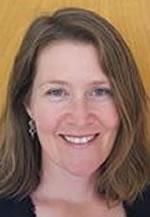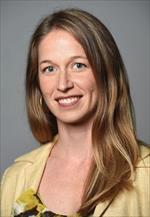The National Institutes of Health (NIH) has awarded more than $4.7 million to a project being conducted in part by UC San Francisco researchers investigating how the environment influences neurodevelopment and asthma risk in children.
The grant was part of $157 million in national awards announced by the NIH for a multitude of projects under a seven-year initiative called Environmental Influences on Child Health Outcomes (ECHO). The ECHO program will investigate how exposure to a range of environmental factors in early development — from conception through early childhood — influences the health of children and adolescents. The studies will target four key pediatric outcomes that have a high public health impact: airway health, obesity, neurodevelopment, and birth outcomes.
UCSF Department of Psychiatry faculty members Nicole Bush, PhD, and Kaja LeWinn, ScD, are co-principal investigators on the grant project, titled "Prenatal and Childhood PATHWAYS to Health: An Integrated Model of Chemical and Social Exposures, Biological Mechanisms, and Sex-Specific Effects on Neurodevelopment and Respiratory Outcomes." In collaboration with their fellow co-principal investigators from the University of Washington (Catherine Karr, PhD, MD, MS), Seattle Children’s Research Institute (Sheela Sathyanarayana, MD, MPH), and the University of Tennessee Health Science Center in Memphis (Frances Tylavsky, DrPH), they will harmonize data from three extant cohorts comprising nearly 3,000 mother-child pairs to examine important questions about the effects of chemical (pollution and phthalates) and non-chemical (self-reported stress and stress biomarkers) exposures during pregnancy and their interaction on developing fetuses.
ECHO program investigates exposures from conception through childhood
The interdisciplinary group will examine the influence of prenatal and early life exposures on children’s neurodevelopment and airway health across early and middle childhood, as well as test whether placental gene expression serves as a biological mechanism for those longitudinal associations.
The study will advance LeWinn and Bush’s programs of research on the biological embedding of early life stress, etiology of mental health disorders, and the complex interplay of physical and mental health across the life course. If the group meets the two-year milestones set forth by the NIH ECHO Consortium, they will become eligible for an additional five years of funding, for a potential total of $48 million over the anticipated seven-year study period.
Other collaborating institutions include Meharry Medical College, Mount Sinai School of Medicine, New York University, University of Minnesota, University of Pittsburgh, University of Rochester, and Vanderbilt University. UCSF Psychiatry's Nancy E. Adler, PhD, will also serve on the project's advisory board.
The NIH awards will build the infrastructure and capacity for the ECHO program to support multiple longitudinal studies that extend and expand existing studies of mothers and their children.
“Every baby should have the best opportunity to remain healthy and thrive throughout childhood,” said NIH Director Francis S. Collins. “ECHO will help us better understand the factors that contribute to optimal health in children.”
About UCSF Psychiatry
The UCSF Department of Psychiatry and the Langley Porter Psychiatric Institute are among the nation's foremost resources in the fields of child, adolescent, adult, and geriatric mental health. Together they constitute one of the largest departments in the UCSF School of Medicine and the UCSF Weill Institute for Neurosciences, with a mission focused on research (basic, translational, clinical), teaching, patient care, and public service.
UCSF Psychiatry conducts its clinical, educational, and research efforts at a variety of locations in Northern California, including UCSF campuses at Parnassus Heights, Mission Bay, and Laurel Heights, the UCSF Medical Center at Mt. Zion, Zuckerberg San Francisco General Hospital and Trauma Center, the San Francisco VA Health Care System, and UCSF Fresno.
About the UCSF Weill Institute for Neurosciences
The UCSF Weill Institute for Neurosciences, established by the extraordinary generosity of Joan and Sanford I. "Sandy" Weill, brings together world-class researchers with top-ranked physicians to solve some of the most complex challenges in the human brain.
The UCSF Weill Institute leverages UCSF’s unrivaled bench-to-bedside excellence in the neurosciences. It unites three UCSF departments—Neurology, Psychiatry, and Neurological Surgery—that are highly esteemed for both patient care and research, as well as the Neuroscience Graduate Program, a cross-disciplinary alliance of nearly 100 UCSF faculty members from 15 basic-science departments, as well as the UCSF Institute for Neurodegenerative Diseases, a multidisciplinary research center focused on finding effective treatments for Alzheimer’s disease, frontotemporal dementia, Parkinson’s disease, and other neurodegenerative disorders.
About UCSF
UC San Francisco (UCSF) is a leading university dedicated to promoting health worldwide through advanced biomedical research, graduate-level education in the life sciences and health professions, and excellence in patient care. It includes top-ranked graduate schools of dentistry, medicine, nursing and pharmacy; a graduate division with nationally renowned programs in basic, biomedical, translational and population sciences; and a preeminent biomedical research enterprise. It also includes UCSF Health, which comprises two top-ranked hospitals, UCSF Medical Center and UCSF Benioff Children’s Hospital San Francisco, and other partner and affiliated hospitals and healthcare providers throughout the Bay Area.









